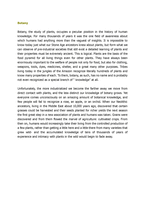영문 Botany영어작문
Botany, the study of plants, occupies a peculiar position in the history of human knowledge. For many thousands of years it was the one field of awareness about which humans had anything more than the vaguest of insights. It is impossible to know today just what our Stone Age ancestors knew about plants, but form what we can observe of pre-industrial societies that still exist a detailed learning of plants and their properties must be extremely ancient. This is logical. Plants are the basis of the food pyramid for all living things even for other plants. They have always been enormously important to the welfare of people not only for food, but also for clothing, weapons, tools, dyes, medicines, shelter, and a great many other purposes. Tribes living today in the jungles of the Amazon recognize literally hundreds of plants and know many properties of each. To them, botany, as such, has no name and is probably not even recognized as a special branch of 몷 knowledge몸 at all.
Unfortunately, the more industrialized we become the farther away we move from direct contact with plants, and the less distinct our knowledge of botany grows. Yet everyone comes unconsciously on an amazing amount of botanical knowledge, and few people will fail to recognize a rose, an apple, or an orchid. When our Neolithic ancestors, living in the Middle East about 10,000 years ago, discovered that certain grasses could be harvested and their seeds planted for richer yields the next season the first great step in a new association of plants and humans was taken. Grains were discovered and from them flowed the marvel of agriculture: cultivated crops. From then on, humans would increasingly take their living from the controlled production of a few plants, rather than getting a little here and a little there from many varieties that grew wild- and the accumulated knowledge of tens of thousands of years of experience and intimacy with plants in the wild would begin to fade away.




 분야
분야


